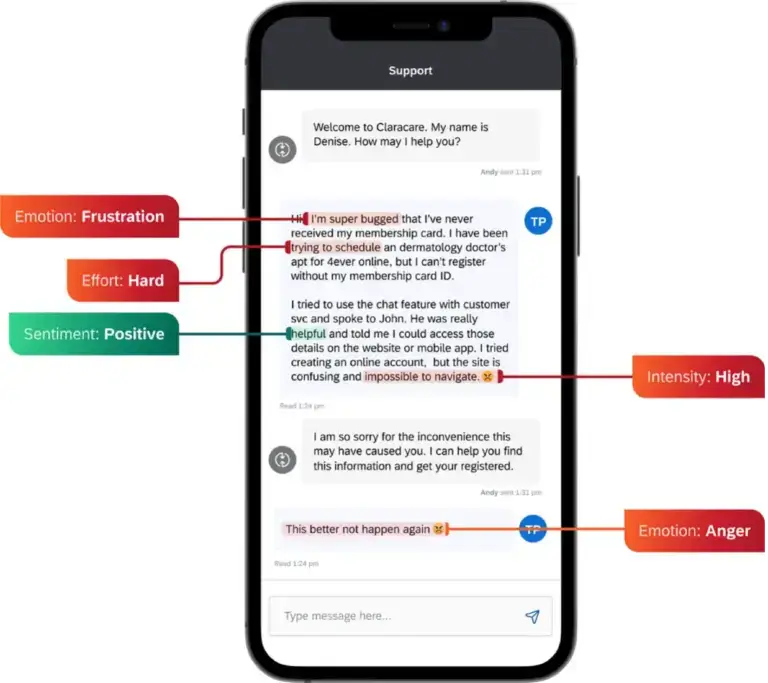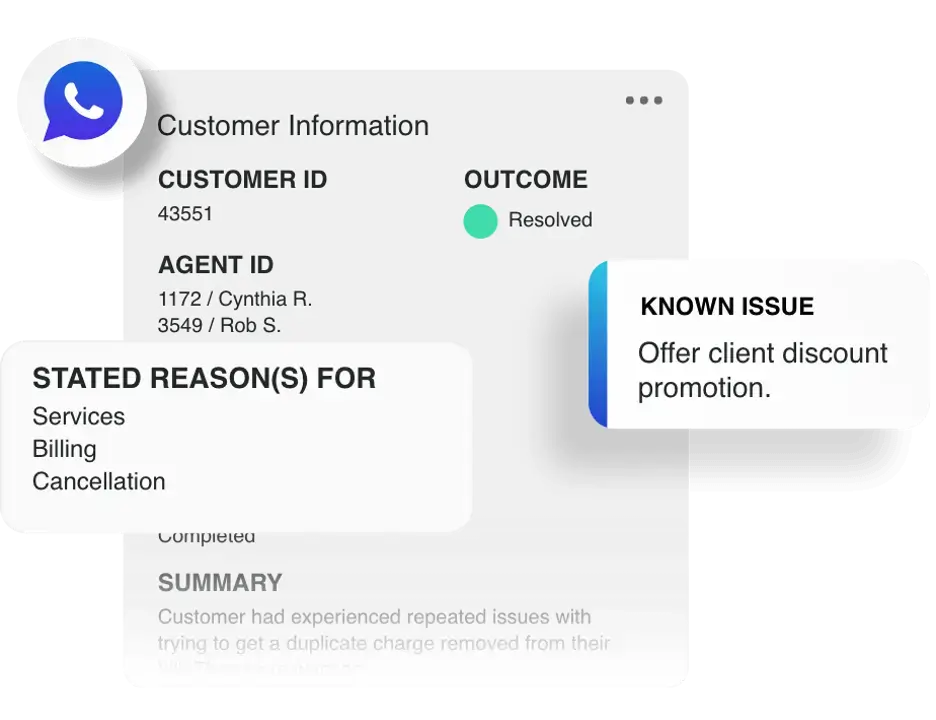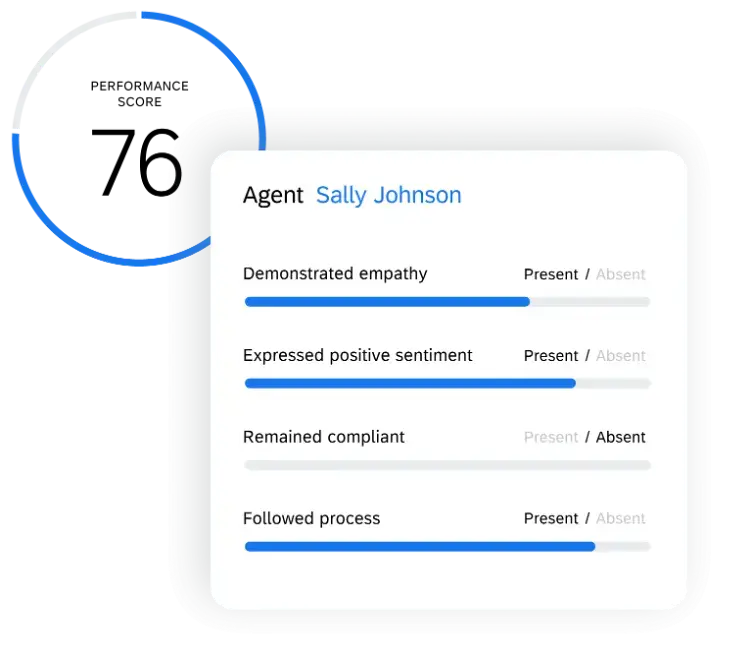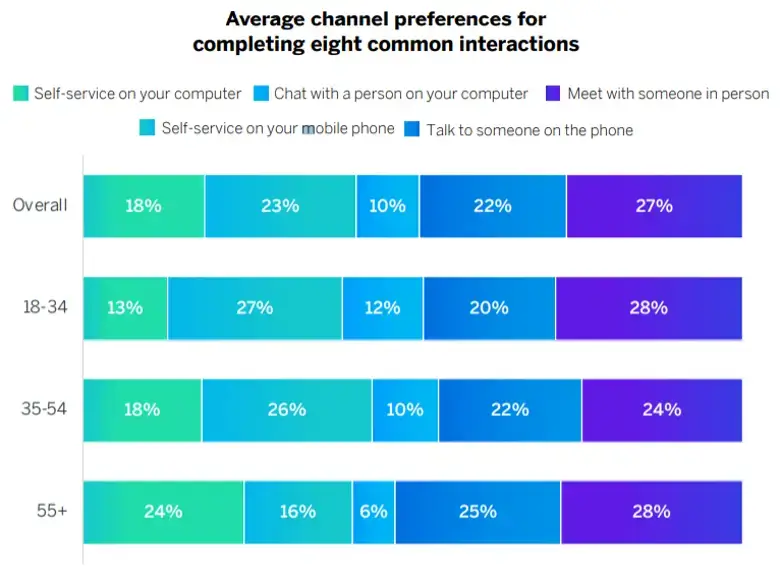How is AI used for customer service?
Artificial intelligence (AI) can be used in several ways for customer service to improve customer experiences and expand your business capabilities. For example, you can use AI technology to create always-on, human-like responses to customer queries and streamline your employee workflows for maximum efficiency.
Using artificial intelligence in your customer service processes allows your support agents to make smarter decisions faster, and meet your customers’ needs more effectively. You can easily provide a more personalized service at scale, in a much more efficient way. This leads to better business outcomes and delivers strong ROI.
But why is AI revolutionising customer service specifically, and how can you leverage AI for better customer experiences? Read on to find out how.
Free eBook: 4 ways AI will transform agent productivity
How does AI customer service work?
Artificial intelligence in this context usually refers to technology that has the ability to understand customer sentiment, emotion and more to set in motion an action (respond, trigger a business process etc.). This technology allows for the automation of standard customer service processes, such as answering queries, sending confirmations and handling repetitive tasks such as post-interaction surveys. This allows your customer service teams to better focus on trickier or higher-stakes interactions.
This automation is made possible through machine learning and Natural Language Processing (NLP). With enough data, this technology can recognise customer queries, formulate a human-like response and take action automatically.
What is natural language processing?
Natural Language Processing (NLP) is a way of modelling human language to allow computers to “understand” text and speech in a human-like way. It uses rules, statistics, machine learning and more to model human language as data that computers can comprehend. This allows computers to understand what customers need, including nuance and context, and formulate the right response.
What are the benefits of AI in customer service?
AI in customer service can provide a multitude of benefits, from an employee, business and customer perspective. Here are a few of the key reasons to invest in this technology:
Increased efficiency for your customer service teams
Using AI customer service technology, your team can become more efficient and spend their time more effectively. For example, you could use chatbots to enable better self service and drive call volumes down, and interactive voice response (IVR) to triage the most important customer calls. You could also use AI to handle repetitive tasks such as post-call summaries or issue logging.
This frees up your customer teams to handle the most important or difficult customer inquiries and prevents them from getting stuck in administrative tasks. With AI helping to handle the lower-risk customer questions and their workload being better spent on higher impact tasks, your team will be more efficient and feel more fulfilled.
Personalisation at scale
Providing your customers with an online customer experience that feels personal to them can seem difficult at scale, but with the right AI tools, you can provide a seamless, exceptional customer experience that is personal to each customer. When your AI is able to understand what customers are saying, wherever they’re saying it, and how they’re saying it, you’re able to better tailor your responses to their particular needs.

For example, if a customer is frustrated about how hard it has been to resolve a problem, rather than applying a stock response, your support team can offer an appropriate mitigating response. If your AI tool is responding, they can offer an apology first, as it can detect frustration and anger in the sentiment analysis of the customer messages. It can even divert more negative queries to a human for response, saving time and streamlining the workflow process for better customer satisfaction.
Easier quality control and evaluation
Though AI in customer service does help to increase productivity and empower the frontline significantly, it can also benefit the management behind the scenes as well. AI can power efficient, intelligent quality evaluation of all interactions, removing the need to do quality control reviews on small samples of interactions.

With automatic quality management, every call, mention, post, chat, text, or any other interaction is automatically analysed and scored using AI and NLP. With script adherence, empathy tracking, sentiment analysis and more, your management can provide more targeted, impactful coaching for better employee and customer experiences.
How to integrate AI into your customer experience
Here are some examples of ways you can integrate AI into your customer service experiences:
Automated call summaries
Rather than requiring your customer service team to complete time-consuming and tedious administrative tasks, you can automate tasks such as call summaries using real-time analysis and transcription that accurately collects and records all relevant information into your system. After a call ends, there’s no need for your support agents to list customer details, customer effort, next steps etc. Instead a call summary is automatically generated so your team members can quickly see all the details at a glance, confirm and move onto the next call.

Real-time agent assist
With real-time agent assist, your support agents are automatically delivered coaching and resources as calls are happening, allowing them to not only see the big picture but get ideas on how to resolve customer queries. Agents can see relevant customer context and are served with suggested next best actions, relevant knowledge base articles o resolve issues and improve customer satisfaction.
Automated quality management

Like mentioned above, automated quality management technology uses AI and NLP to automatically evaluate all interactions, as mentioned above. Not only does this save management time, but it also mitigates compliance risk. The technology can flag when issues such as non-compliance with scripts happen, allowing your management team to catch and address issues quickly.

Quality management powered by AI also benefits your agents by ensuring transparent, credible evaluation of their work. With personalised quality dashboards for agents and managers, provide AI-powered tailored coaching recommendations and surface the traits and behaviors behind your best agents, so you can raise everyone’s game. Agents can track their own performance and flag evaluations they don’t think are fair, helping to foster a culture of transparency and continuous improvement.
Omnichannel analysis and insight for business-wide innovation and improvement
AI in customer service allows you to build an extremely comprehensive view of your operational data and customer information for better business processes. Rather than working with data siloed across different teams and departments, with automated workflows and insights delivered from your frontline to your backend development, you’re able to make improvements company-wide.

AI customer service automation best practice
Make your AI work with your customer service teams, not against them
Your AI customer service automation should be designed to work alongside your support agents, rather than against them or worse, replacing them. Some customers will always prefer to speak to a human agent, particularly for more complex issues or specific tasks. For example, those aged 55 or over might prefer to talk to someone on the phone or meet with someone in person to resolve billing issues, buy a new television or other common interaction.

Ideally, your AI should make the support team experience easier, streamlining processes, handling repetitive tasks, and providing better customer data to your team to help with supporting customers. That way, customers that still prefer a human agent to speak to won’t feel negatively about their experience, but customer issues that can be handled faster via AI tools can be taken out of your team’s workload.
Artificial intelligence is best used on tasks that a human agent could perform, but that takes up valuable time and energy. For example, using your AI tools such as a virtual assistant to answer frequently asked questions, offer multilingual support or give updates on order status can really improve customer opinions. However, for more complex issues, it’s best to still retain a human touch.
Deliver AI insights across your business
AI in customer service isn’t just for the benefit of your frontline team or your management – it’s also beneficial for product developers, marketing teams and more. Your AI powered insights can deliver insights on product functionality, marketing strategies and more, based on customer data gleaned from customer service interactions. Predictive analytics can also help you to plan ahead for potential ebbs and flows in business, or changes in public opinion.
Integrate your AI tools into your existing tech stack
For the best results, integrate your AI technology into your existing tools to create a cohesive ecosystem that supports best outcomes. Rather than keeping your customer support technology separate to the tools your teams already use, make sure you’re leveraging AI alongside software your teams are already familiar with. Your internal systems don’t have to change – they just need to be better integrated for maximum efficiency.
Make AI work for you and your customer with Qualtrics
Your AI strategy should always put your customers and your support agents first. That’s why Qualtrics’ Frontline Care uses artificial intelligence and machine learning to optimize your workflows and your employees’ time, while also creating memorable, personalized customer experiences.
Free eBook: 4 ways AI will transform agent productivity